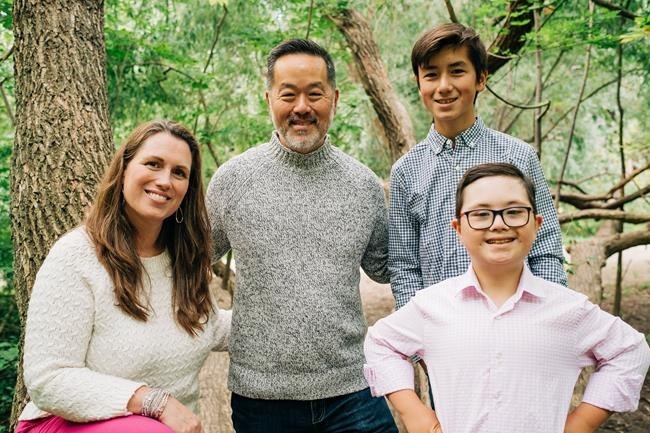TORONTO — Back-to-school prep for Toronto mom Valerie Tih involves homework she’s assigned to herself — a crash course in artificial intelligence tools that she expects her sons may encounter this school year.
Describing the advent of online helpers like ChatGPT as “coming like a tsunami,” Tih says she’s spending the last weeks of summer learning what she can about how they work and what they can do.
Questions that plague her include how emerging tech may be used in the classroom and whether it will affect the ability of her 10 and 14-year-old boys to develop their own critical thinking skills, creativity and moral compass.
She's not alone. Family coaches and media experts say they're increasingly hearing from parents concerned about how rapidly advancing chatbots and writing tools could affect their kids. They encourage regular family conversations about schoolwork and that parents model healthy tech use themselves.
As a former teacher, Tih says she expects educators and curriculums will address increasingly sophisticated tools that colleges and universities are also grappling with.
But until then, it’s up to her to make sure her kids can navigate an academic career vastly different from the one she had. She says her older son has already told her of a classmate caught using an unsanctioned AI tool for a Grade 8 assignment last year.
“I just started thinking about it more deeply but it feels like something that's coming like a tsunami,” says the 52-year-old Tih, a parenting coach who has heard similar concerns from other families.
"Or like a fire hose and I'm, like, trying to drink from the fire hose and understand it a little bit.
“It's a lot."
Child psychologist Linda Pagani suggests parents explore these tools with their kids and then discuss how they appear useful, where they fall short and what problems may arise.
She says teens should do homework in a common area like the kitchen table, not alone in their room where YouTube and other distractions prevail. While many tweens and teens are computer savvy, the University of Montreal professor says that without adult guidance they may struggle to fully grasp possible online safety issues and ethical dilemmas.
“Between ages 13 and 15 there is a cognitive shift that makes them more able to have abstract thinking and as a result, they do have these internal moral debates – especially if parents and teachers bring that up,” says Pagani.
During these talks, she cautions parents against describing AI tools as either good or bad, but rather how they might be useful or not.
"Teenagers, as soon as we say something is bad … they'll think it's cool," warns Pagani.
If cheating is a concern, media literacy expert Matthew Johnson points to research that suggests it's most common when parents or schools “emphasize results over process, and grades over learning.”
A good way to stress learning for its own sake is by expressing that yourself — take kids to museums and art galleries and foster their interests from a very young age, says Johnson, director of education for the group MediaSmarts.
Ottawa mom Lian Wright says she's questioned her 12-year-old daughter and 10-year-old son separately about what they know about online AI tools, why they are used and the consequences of using them.
Both had heard about AI-powered chatbots but had little direct experience. And both insisted they would never use them to plagiarize — an offence their school has been explicit about, she says.
"I can see them wanting to get the work out of the way but they're not going to (risk) getting into that much trouble," says Wright, adding that their resolve has yet to be tested — it could evaporate if they're actually faced with a looming deadline and a mountain of work.
Aside from cheating concerns, Wright worries further tech use in schools could exacerbate inequities between kids who have access to technology — and help from tech savvy parents — and those who do not.
Wright, who is Black, also wonders if AI tools could expose her mixed-race kids to inaccurate, harmful or racist information, or generate offensive material for classmates that sow divisions among students.
She says she's readying her kids for digital challenges by making sure they are comfortable turning to her for help when they need it, that they have good self-esteem and that they develop a strong work ethic.
"I'm just hoping that based off of the foundation that we're creating they feel as though they're confident enough in themselves (and) in their work that they're not going to have to rely on this to get by," says Wright.
Toronto dad Mike Brcic says he’ll be putting his three teens through “AI boot camp” in the weeks leading up to the first day of school to ensure they are equipped to handle any pitfalls.
Brcic says he’s used several online tools while running an adventure retreat company: ChatGPT to develop business strategy, Automata to turn blog posts into bite-sized chunks for social media and Notion, mainly to summarize articles and books.
He uses them to be "more efficient and productive," but doesn't see those attributes benefiting the education of his 13-year-old twins and 15-year-old. He's trying to envision the best way for kids to use online AI but doesn't have an answer.
"I don't really want my kids to be more productive or efficient. I don't know if you can make learning more efficient or productive,” says Brcic, nevertheless intent that his kids become familiar with emerging tech.
“I take my inspiration from that saying: 'AI isn't going to steal your job, a human using AI is going to take your job.' And so what does that mean for my kids?"
This report by The Canadian Press was first published Aug. 21, 2023.
Cassandra Szklarski, The Canadian Press

